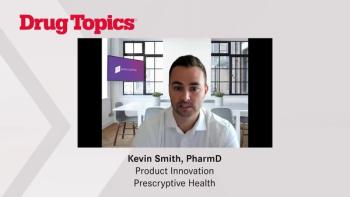
Drug Delivery: The Sky is Not the Limit
The use of drones to deliver critically important therapies can help overcome the barriers to care that impact patients in metropolitan areas.
Pharmacists and physicians share a heartfelt desire to meet patients where they are on their healthcare journey and to break down the barriers to care that challenge far too many, particularly those with chronic, complex conditions. Even in metropolitan areas, where e-commerce has fueled the creation of networks that make it possible to deliver pharmaceuticals directly to patients’ homes faster than ever, traditional delivery methods often fall short.
Fortunately, there is an alternative. Autonomous aircraft—drones—have the potential to dramatically streamline the delivery of pharmaceuticals. While their use to fulfill prescriptions may strike some as more science fiction than reality, their utility and effectiveness is already proven in demanding environments where the ability to quickly deliver therapies saves lives.
Rwanda is one of many examples. Across the country, you'll notice a sophisticated operation in the sky. Pharmacists and physicians are using drones to deliver much-needed medical supplies, including blood and vaccines, to health care facilities both large and small across hundreds of square miles. And they are doing this faster and more reliably than ever before.
Built and operated by California-based Zipline,1 a company whose drones have safely flown more than 250,000 commercial flights and more than 18 million miles, the autonomous aircraft used in Rwanda are loaded and in flight within 15 minutes of a prescription being written.
With a wingspan of just over 10 feet, quiet electric motors, and the ability to deliver a payload of 4 pounds with unflinching accuracy using a simple paper parachute, each drone can fly 100 miles round-trip before automatically returning for a fresh battery pack and new prescription. Such performance is equally applicable to metropolitan areas in the United States.
Magellan Rx Management recently announced2 a collaboration with Zipline to become the first pharmacy benefits manager (PBM) to deliver medications to patients via drones. It is an exciting effort that will:
Increase Access to Therapies: Pharmacists work hard to make it easier for patients to attain the prescription drugs they need; however, parcel carriers typically offer a full-day delivery window that can be problematic for sensitive specialty drugs. It also requires patients to organize their time around an anticipated arrival. It’s a reality that is inconvenient at best, and problematic and worrisome for patients with busy family and work schedules. Patients need on-demand prescription drug delivery.
Improve Patient Care: Prescribed pharmaceuticals aren’t just lifesaving—they’re life-enabling. This is particularly true for those with chronic or complex conditions. Failing to take therapies as prescribed can have an immediate and dramatic impact on patients’ care and well-being. As patients experience less of a burden around when, where and how care is delivered, they will become more empowered and take more control over their health.
Drive Greater Efficiency: The healthcare industry has made great strides by embracing new ways of working, but the most effective way to drive greater efficiency is to encourage healthier behavior among patients. Population health begins with the individual, but it is influenced by the services and ease of use pharmacists and pharmacy organizations offer. What we all need is a way to deliver prescription drugs on-demand, giving patients more say and control as to when they are delivered.
Autonomous aircraft help by addressing these needs in a 15- to 30-minute window—all while eliminating administrative burdens with an on-demand alternative that’s easier to manage. There are other benefits, too, including the smaller carbon footprint and reduction in road congestion and noise associated with electric drones instead of much larger and less efficient delivery trucks. For these reasons and more, the next time you write a prescription, you may want to look to the sky.
References
- Zipline. Accessed February 21, 2022.
https://flyzipline.com/global-healthcare#howItWorksSection - Magellan Rx management collaborates with Zipline to deliver prescription medications by autonomous aircraft. News release. Magellan Health. February 1, 2022. Accessed February 21, 2022.
https://ir.magellanhealth.com/news-releases/news-release-details/magellan-rx-management-collaborates-zipline-deliver-prescription
Newsletter
Pharmacy practice is always changing. Stay ahead of the curve with the Drug Topics newsletter and get the latest drug information, industry trends, and patient care tips.























